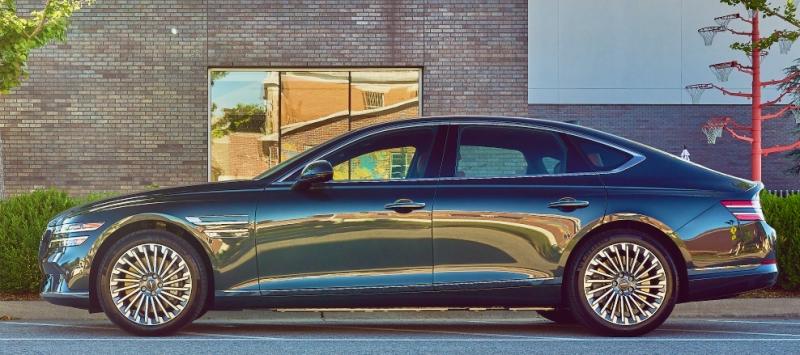Genesis G80 AWD Electrified
First, a note: After the Mercedes-Benz EQS 580, I promised a review of Mazda’s CX-30 compact SUV. Instead, I received a Mazda3 compact sedan. Altogether a fine car, and a fun car, but since it was a 2023 model and the ‘24s are already out, and since it was little different from the 2021 version except for a few refinements such as a top-down camera and a bump in power, I passed on it. Now the Mazda3 has been replaced in my driveway by a luxurious electrified Genesis G80 sedan. Does it live up to the hype?
Yes, it does, and thank you for asking. Genesis vehicles (once again: Genesis is Hyundai’s luxury division, its Lexus, one might say) never fail to impress for a variety of reasons: Across the entire, eye-catchingly stylish lineup, they are wonderfully refined and well thought out; they appear to be very well bolted together, and they offer good value and lo-o-ong warranties.
The G80 is the line’s mid-size sedan, slotting inbetween the G70 and G90. It may be mid-size by definition, but it feels like a large car (although the batteries do encroach somewhat on the rear seats and trunk). So far, it is the only electrified model in the G-series, and the “old” gas-powered G80 is still available. There are two reasons one might choose an IC G80 over an EV G80: The need to drive where charging stations are scarce; and the price is as much as $30,000 less.
Otherwise, the G80-e is hard to beat. Yes, it’s packing an extra 1,200 pounds of lithium-ion polymer batteries, but its pair of electric motors, one on each axle, produce so much more power—700 lb-ft of torque v. the gas car’s 311 or 391, depending on whether the 4- or 6-cylinder engine is onboard—that the extra weight is unnoticeable. Like most EVs, the G80-e feels strong like bull. Also like most EVs, the battery pack is in the floor, which lowers the center of mass and helps the car handle that much better.
As well, the price difference between EV and ICV shrinks dramatically when apple is put alongside apple: At $79,825, the G80-e AWD is fully loaded; a similarly equipped, top-of-the line gas G80, the 3.5T AWD, costs only about $5,000 less. When stacked up against the EV’s addictive whoosh of power and its silent, near-ghostly grace, not to say the environmental and financial benefits of not vaporizing gasoline, the surcharge seems worth it.
As for us, we no longer suffer from range anxiety. One day last week, we set off for Portland with a full “tank”—87.2 kWh of juice, predicted to be good for 294 miles. On our return that evening, after running errands and visiting, the G80-e’s computer reported about 60 miles of range remaining.
Only 60 miles left? No problem. That very day, while we were away, Penobscot Electric had installed a universal Level II fast charger in our garage. I ran the heavy-gauge 24-foot cable out to the G-car, plugged it in and two and a half hours later the “tank” was full again. A Level III rapid charger such as we’d find at a highway rest stop would have done the job in about 25 minutes; on normal household current, it would have taken about three days.
Sedans are relatively rare now, in the era of the SUV, but Genesis reminds us that there’s life left in the four-door “saloon” (as the Brits say) style, especially with electric power. As well, the sophistication and value-for-dollar of cars from Genesis, and from parent company Hyundai, make it clear that Korea’s Hundred Year Plan to achieve global manufacturing excellence is quite far along.
Next week: Dodge Swinger Special Edition



































